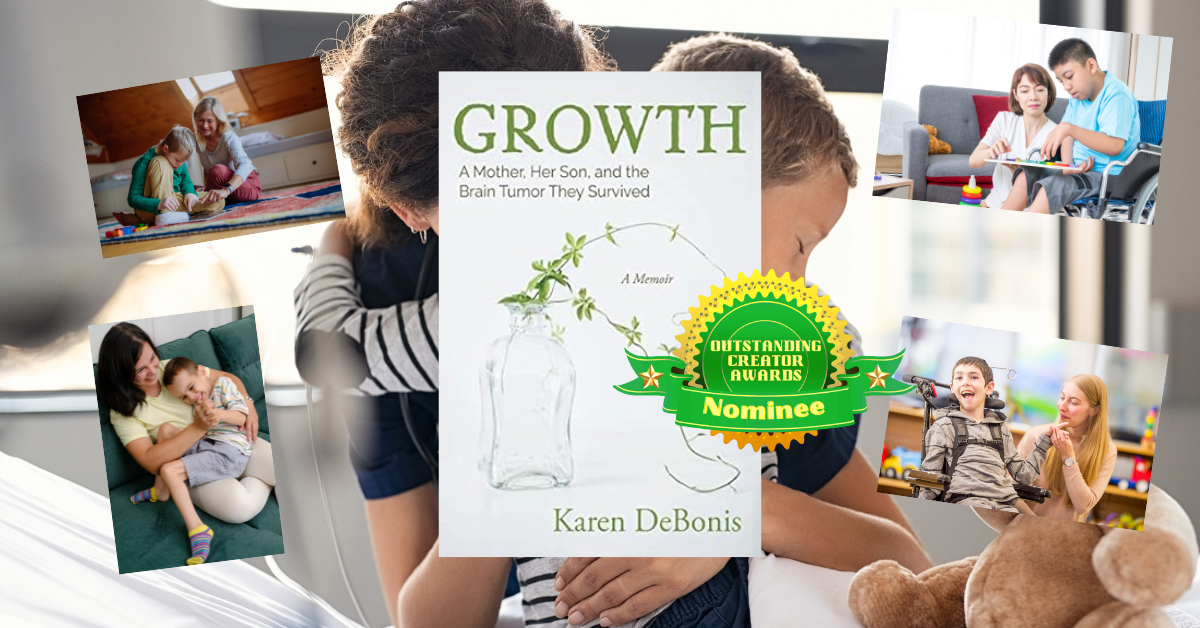|
Score: 95/100 (9.5 out of 10)
In a contest full of gritty, emotionally-charged books, Growth by Karen DeBonis stands out as one of the grittiest and most emotionally-charged of them all. Growth is a captivating memoir that follows Karen DeBonis on a 20+ year journey as she takes up the arduous and beautiful task of raising a son with a disability. Matthew DeBonis was born unique and different. At first he was colicky (infants who cry and/or are “fussy” perpetually), something that seemed temporary. However, over time, Matthew began showing signs that something might truly be wrong—perhaps even life-threatening. Karen and her husband, Mike, watched with grave concern as Matthew's grades steeply declined along with his cognition, memory, and even his ability to move normally or at the same speed. Compounding problems, Mike was diagnosed with diabetes, something which came to demand his attention at the worst possible time. Seeing Matthew's decline, Karen and Mike went to their doctor who gave them an unsatisfying, unthorough, and ultimately inaccurate diagnosis that the family believed and lived with for years. Herein lies one of the book's key points: always seek a second or even a third opinion. Never leave your health in the hands of one other person who may fallible or outright wrong. If Karen and Mike had just went with this first diagnosis, Matthew would likely have passed. The mystery surrounding Matthew's illness/condition is also one of the biggest motivations to keep reading. We, along with the parents, are constantly on edge about what is going on with this incredible boy. Does he suffer from some kind of autism? Does he have cancer? ADD? ADHD? This mysterious, fatal disease called leukodystrophy? Does he have muscular dystrophy? Or is it something else... something that hasn't been diagnosed or considered? We don't want to spoil it for the reader because this is a huge motivation to keep reading. However, the real driving force behind this book—the heart of this book—is a mother's love for her child. Karen loves Matthew even when it's hardest and seemingly impossible to. It's both inspiring and frightening, such as when Karen expresses her extremely negative or even violent thoughts. Despite Matthew's medical issues being at the center of this book, Karen's issues are arguably just as pronounced. Karen seems to suffer from a number of ailments including postpartum depression (which sounds a bit more like postpartum psychosis when she starts having thoughts of violence) and overeating disorder. The overeating disorder comes about so subtly that it's easy to forget that it's there, but a keen eye can recognize the signs. At times when Karen is the most stressed or anxious, she is quick to bury herself in Little Debbie wrappers. While this might seem humorous to those who haven't suffered from an eating disorder, it can be sad or perhaps even a bit triggering to those who have. It definitely pulls at your heartstrings. A lot of this book does. Matthew stands out as an incredibly inspirational and compelling figure. While it's tragic and sad to see his sports and academic skills diminish, it's also inspiring to think that this boy still made it through school (against all odds), still played ball, still performed in magic shows, worked jobs, got his own home, and even won a Louis Armstrong Jazz Award! The story of Matthew, while also a cautionary tale about pursuing an accurate medical diagnosis, is also an inspirational one that even those who are disabled can grow and thrive in life. This is what Matthew and Karen to call “post-traumatic growth”--helping to give the book its title. Check it out on Amazon!
0 Comments
Leave a Reply. |
Archives
July 2024
Categories |

 RSS Feed
RSS Feed